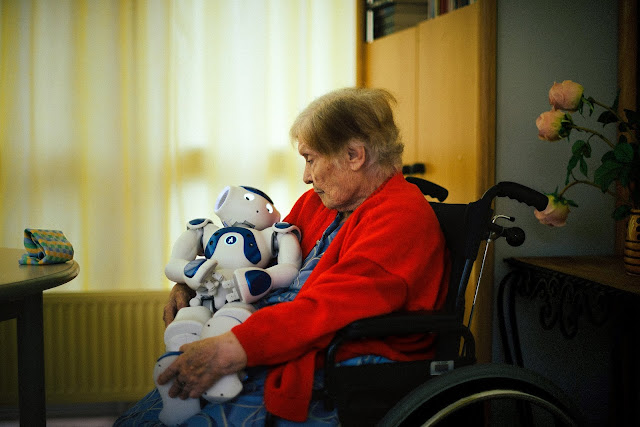Have we started doubting our own intelligence?
A loving companion indeed - but this device is secretly picking up pulse rate and heat beats of its host and keeping the physician alert. Humans possess intelligence, though sign of it is visible in other forms of life too. But humans are possibly making use of it most. Intelligence has led to invention. Amidst the chaos around, both intelligence
and inventions are working to make a pattern, a practical and workable system in which we live now.
My office chaos is taken care of by a handful of computers, and with them a
system came to be in place. The clerks are gone. So are the ledgers. The
answering machine handles the receptionist’s job. Computers take care of
countless computational work, data storage, paper-processing and task
reminders. The computer even corrects an absent-minded staff and at times takes
over the job of a missing employee. My product deliveries within the city are
transported clear of traffic clogs by a fast-thinking software working in a
route planner. This is the scenario elsewhere, too, and will soon be
everywhere. It has been long realized that conflict in human judgment where it
matters most in society must be removed to bring speed, uniformity and organization,
both of which are essential for running the systems in a fast-changing
urbanized society. Intelligence is making this possible through AI.
Soon, a single body, a computer,
will hold everything humans have ever known. This will be the most intelligent
body ever to have existed on Earth and, amusingly, it would be a machine. When
I realized the seriousness of this development, it led me to wonder: “Will this
supernatural singularity be able to perform miracles, too? Will this be the new
God I ponder?”
The
process of computers taking over critical work such as decision-making and
execution of precision jobs is now before us. Experiments for many more such
replacements are on the horizon. Artificial intelligence, or machine
intelligence, is taking over. In the process, the first to go will be tasks
performed by humans. This intelligence will take the place of humans
themselves. While robots perform manufacturing jobs at the workplace, a home
robot will replace a human partner to give companionship. A company making
dolls is already producing life-size human partners, which can outperform a
human as a homely companion. It will greet you with compassion when you reach
home after a day’s work and walk up to you to take your coat off. Soon, we will
witness people having relationships with such made-to-order robot companions.
If we have accepted same-gender marriages, why not machine companionship?
A
few years ago, I was nervous when for the first time I sat in a self-driving
taxi in a business park. The concept of driver-less taxis was in popular news,
but experiencing it first-hand was quite a thrill. Though it was a short trip,
I had doubts as to what the future was for it as a service tool. Much later,
when my own car navigation application found a small alleyway after noticing a
delay on the usual main route due to a blockage, artificial intelligence got
down to work. I was more than impressed. It took me to the alleyway, but I had
my doubts as it was not marked, looked private and was narrow. But I obeyed and
in ten minutes, I was brought back to the main thoroughfare without a scratch.
It couldn’t have been possible with human maneuvering, but here the high-speed
processor in my car did it all on its own.
Today,
computers, or machine intelligence, run everything from space exploration,
medical diagnostics, financial audits to communications, and more. Bank
computers will soon decide an individual’s eligibility and risk factors before
processing a loan application. It will run the customer’s profile through
countless social networking sites, and check credit card usage, airline travel
and hotel stay data to determine his economic identity. The judiciary, too,
will be run by artificial intelligence. Machines will prosecute humans, and
possibly send one to the gallows.
The
power of processing has increased exponentially to a level where human lives
are more influenced by sophisticated software inside high-speed computing
devices, than by people’s beliefs. The mind, too, is being controlled by
machines, and machine intelligence. The new generation of millennial are
growing up under the total control of an artificial entity. Every aspect of
their lives is suddenly coordinated, irrespective of religion, culture, gender
or race. As I observe, I find the new generation to be under some remote
influence.
Human
lives have become simplified, regimental but fearfully predictable now. I have
a friend who looks after an online travel booking service, and once sitting
with him in his office, I was informed about the algorithms working in his
computer. He can now control the choices of his logged-in clients with great
accuracy. He can stalk his client and even make him buy whatever he wants him
to. It would be shocking to be in the shoes of such a client. This is possible
because suddenly, our lives have become a choice between binaries – between “to
have” and “not to have”, “to want” and “to reject”, “to like” and “not to
like”, “yes” and “no”. The challenge of living is turning into the fulfillment
of these simple actions, one linking to the next. This is all being powered by a hand-held
smartphone, which is helping execute these actions. The device is not just a
device any more but an aid – a part of the body, an organ. It has made humans,
without them knowing, more intelligent, and probably freer. With a smartphone
in hand, a human has become a double intelligent being.



Comments
Post a Comment